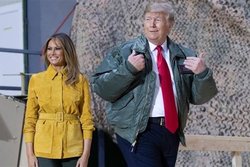 US President Donald Trump and his wife, Melania, have made a surprise visit to Iraq, meeting American troops fighting one of the many wars that he has mocked in the past as costly blunders.
US President Donald Trump and his wife, Melania, have made a surprise visit to Iraq, meeting American troops fighting one of the many wars that he has mocked in the past as costly blunders. RNA - Fifteen years into America’s invasion of Iraq, the unstable security situation in the country forced the Trump to depart Washington on a clandestine flight that landed at the Al Asad Air Base in west of Baghdad on Wednesday.
The trip came amid Trump’s many problems in Washington, ranging from a partial government shutdown over the funding of his border wall to an unsteady economy and a controversial decision to end US military presence in Syria.
The American head of state has in the past sought to distance himself from the Iraq War and other foreign conflicts left behind by his predecessors.
In a surprise decision that put his security team at odds and prompted Secretary of Defense Jim Mattis to quit, the president ordered a complete withdrawal of 2,000 American troops from Syria and a substantial reduction of the 14,000 US troops in Afghanistan.
For Iraq, however, the president said he had no such plans for the 5,000 or so American troops in Iraq, who have been redeployed to the country since 2014 to aide a US-led campaign against Daesh.
“In fact we could use this as the base if we wanted to do something in Syria,” he told troops at the Al Asad base.
Talking to reporters, Trump defended his Syria decision and said people were going to eventually understand his reasoning.
“I think a lot of people are going to come around to my way of thinking. It’s time for us to start using our head,” said the president.
"The United States cannot continue to be the policeman of the world," he added, saying his generals have had “enough time” to fight the war and that they have been told to leave Syria without any delays.
Trump admits security concerns over trip
Iraq trips by US presidents and other high-level Western officials to Iraq are usually shrouded in mystery.
Bush made only four trips to Iraq after ordering his forces to invade the country in 2003. His successor, Barack Obama, visited the war-torn country only once.
Trump admitted that he had security concerns about the trip and certain measures had to be taken to ensure nothing would go wrong.
"I mean, look, I had concerns for the institution of the presidency, not for myself personally. I had concerns for the First Lady, I will tell you," he said. "But if you had seen what we had to go through with the darkened plane, with all windows closed, with no lights on whatsoever, anywhere, pitch black."
A decade-and-a-half later, the US-led war on the false pretext of finding Iraq’s weapons of mass destruction has killed hundreds of thousands of Iraqis and some 5,000 American troops without yielding any meaningful results.
Trump said Obama’s rushed decision in 2013 to leave Iraq paved the way for Daesh terrorists to gain power.
Faced with growing criticism on his failure to build his anti-immigration wall on the border with Mexico, Trump wants to score positive headlines and buy himself more time by delivering on his other key campaign promises, including returning troops back home.
Trump-Iraqi PM meeting canceled
Meanwhile, Iraqi Prime Minister Adil Abdul-Mahdi's office announced that a scheduled meeting between him and Trump was scrapped over disagreements in how to conduct it.
"A disagreement over how to conduct the meeting led to the meeting being replaced by a telephone conversation," the office announced in a statement.
Iraqi lawmakers criticize Trump visit
The trip did not go down well with Iraqi lawmakers and militia leaders, who condemned it as a violation of Iraq's sovereignty.
Qais al-Khazali, the leader of the Asaib Ahl al-Haq fighters, said on Twitter, "Iraqis will respond with a parliamentary decision to oust your (US) military forces. And if they do not leave, we have the experience and the ability to remove them by other means that your forces are familiar with."
Sabah al Saadi, the leader of the Iraqi' parliament's Islah bloc, called for an emergency session of parliament "to discuss this blatant violation of Iraq's sovereignty and to stop these aggressive actions by Trump who should know his limits."
"The US occupation of Iraq is over," he asserted.
The Bina bloc, Islah's rival faction, also took issue with the surprise visit, calling it "a flagrant and clear violation of diplomatic norms."
It also said Trump's visit raises questions about "the nature of the US military presence and its real objectives, and what these objectives could pose to the security of Iraq."
Falih Khazali, a politician allied with Bina, said Washington wanted to increase its presence in Iraq.
"The American leadership was defeated in Iraq and wants to return again under any pretext, and this is what we will never allow," he said.
847/940